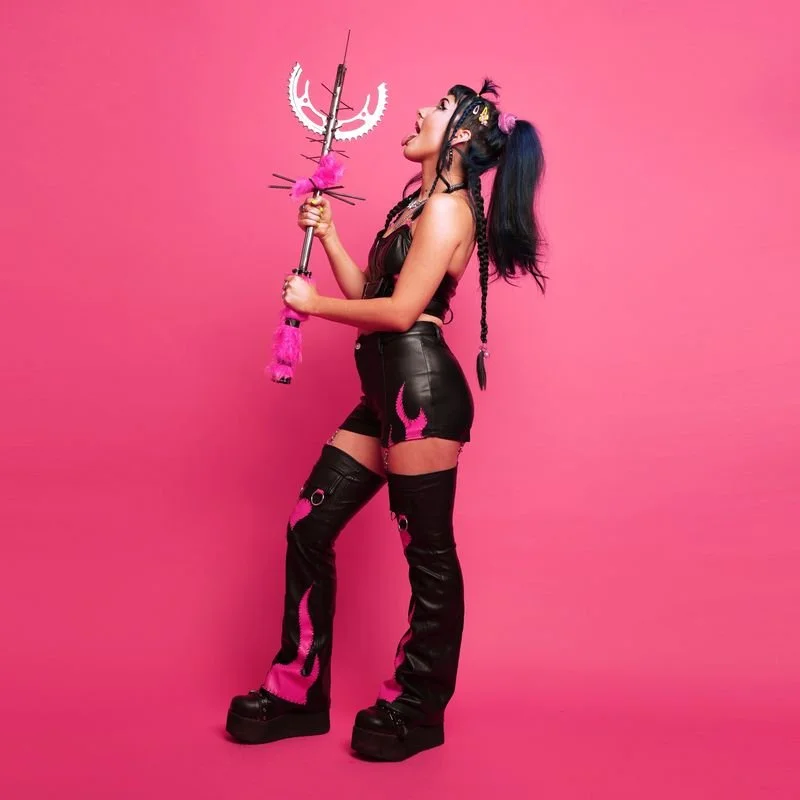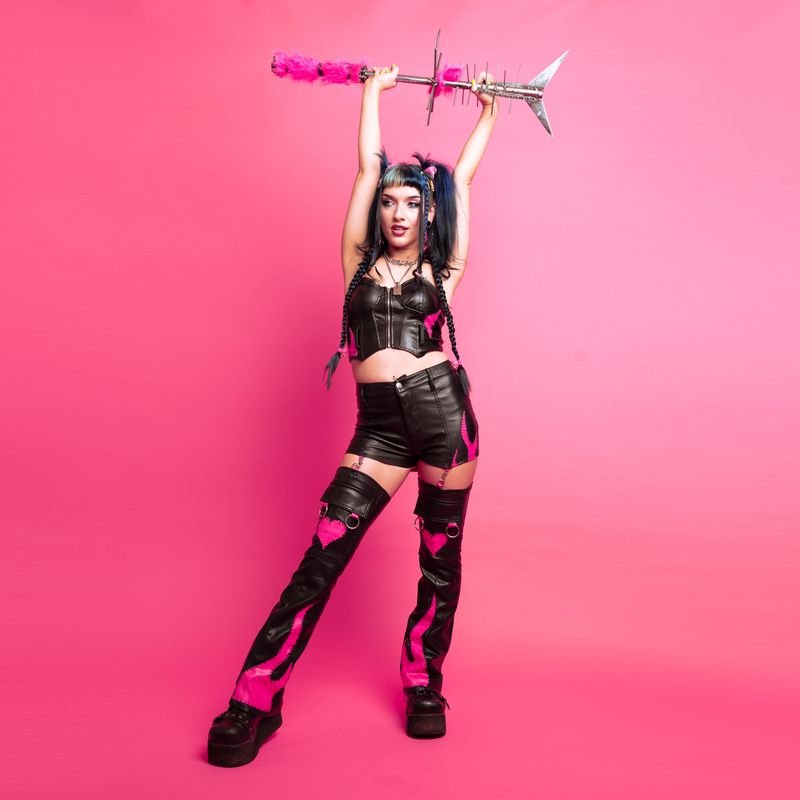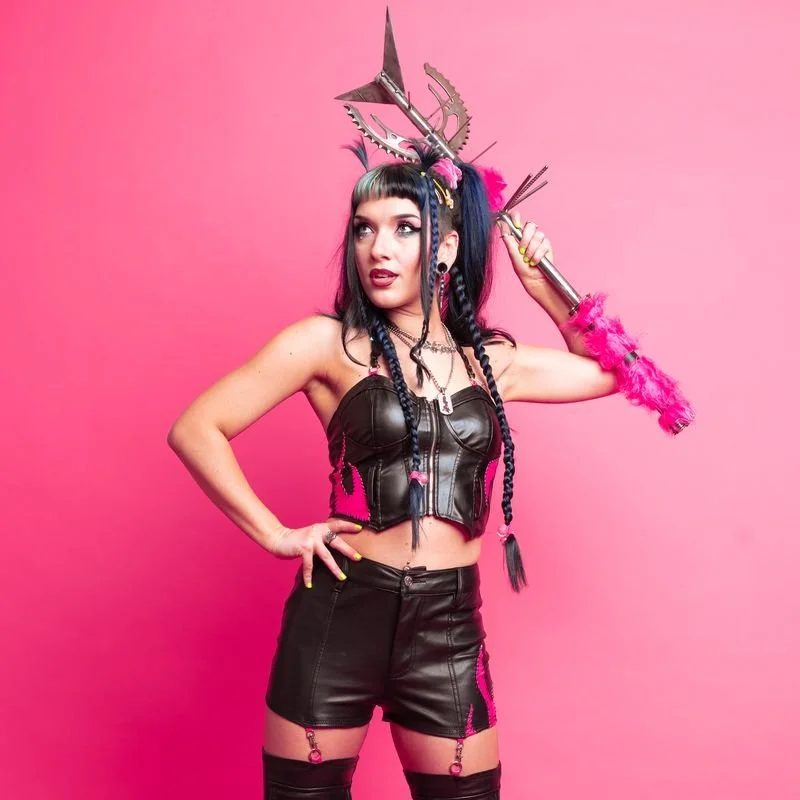(EXCLUSIVE INTERVIEW) DELILAH BON: “When I look back over my life, I want to know that I always spoke up.”
Delilah Bon is the rockstar many of us wished we had growing up; her music tackles difficult yet powerful themes evident in her most recent album, Princeless Princess. Addressing what many of us were sold: the idea of a Prince Charming and the expectation that comes with it.
Her upcoming UK tour of the same name sees her hit the road this very Thursday, and for those going, expect unashamed pride and female energy that is finally on par for the modern times. There's an uprising where girls have woken up from having to fit into traditional gender roles, tired of being told what they should and shouldn't have. It's easy to see why Delilah is on such an uphill success; she's a musician for all genders and identities. While the word 'role model' can easily be thrown around, it's a role she's happy to take on and deservedly so.
We spoke to the pink princess about her latest album, the beauty in angsty songs, her upcoming UK tour and for those attending, you are sure to be in for one hell of a good time.
SpinVybe: You’re about to head out on your UK Princeless Princess tour. For those going, what can they expect from the shows? And for first-timers, what is the general vibe that makes a Delilah Bon gig?
Delilah Bon: Oh, it’s pure empowerment. My fans tell me it’s their safe space to rage and also shake ass, which I love. A big part of the show is the cathartic element, but then there’s also so much fun. I’m holding hands, dancing in the pit, giving people my mic. It’s very intimate and special for people who don’t usually feel seen, I make the night all about them.
SV: When you perform, what’s the one thing you ensure happens at every show that makes it unforgettable for both you and the fans?
Delilah Bon: I think it’s the connection when I’m singing to people. I always look at my fans and sing directly to them on certain lines. I see how people’s faces light up, I know how much these shows matter to people, especially survivors, when I’m singing about sexual assault. I want people to go home feeling like I really saw them and screamed for them, you know.
SV: In an industry often cloaked in black aesthetics, you stand out in unapologetically pink, hyper-femme looks, which as a pink enthusiast I appreciate. What draws you to that visual identity, and what does it represent to you?
Delilah Bon: Oh, I loved pink as a child, and my bedroom was actually princess-themed with a dragon drawn on my wall when I was around 8. My mum did that with stencils, and I think subconsciously I’ve drawn a lot of inspiration from my childhood when I’ve created my aesthetics now. As a teenager the colour pink gets bullied out of you because the patriarchy has you viewing anything feminine as a weakness. I’ve definitely reclaimed the colour pink and associated it with my childhood and the strength of being a girl. Pink was never the problem, it was the misogyny around it.
Photo Credit: Helen Tate
SV: Your music is so unashamedly loud in terms of message and sound. I think we need more artists like you out there for women and girls. When it comes to lyrics, how do you decide what themes to tackle? There’s a lot to dive into.
Delilah Bon: Oh, there’s so much to dive into, truly. I get inspired a lot by my past and not speaking up. I feel like I’ve been holding back words my whole life, and finally now having the freedom to speak up is exhilarating. I am constantly reading and sharing news about women, LGBTQ+ and POC people and their struggles around the world in today's society, which motivates me to stand up not only for myself but for others. Sometimes I write more fun, sassy songs to give myself a break, but Delilah Bon was always about being outspoken and providing the rage to topics that need it.
SV: September saw the release of Princeless Princess. A fab title. The lead track of the same name is so spot on for modern times; you’ve completely changed the narrative, and it's a breath of fresh air. What inspired that concept?
Delilah Bon: The EP is related to my childhood and growing up with this expectation to find my Prince Charming. I think most young girls are given this image of what their lives should be and how by a certain age they should be wives and mothers serving their husbands and playing happy families. It’s not that I disagree with true love, I’m very much a lover girl. It’s more that I disagree with this patriarchal idea that an entitled Prince Charming man will bring you, your happily ever after if you wait around long enough and submit to him. I want this EP to empower young girls to be their own happily ever after and not focus too much on outdated gender roles that leave us trapped with miserable men who aren’t worthy of our magic.
SV: Each of your albums sounds so different and experimental yet still so distinctly you. How do you keep that creative freedom? Would you say that a sense of artistic independence helps you play with sound more?
Delilah Bon: Oh yes, for sure, there are no rules. I can scream, rap, sing, and do a little opera middle 8 about loving my bush, and nobody can stop me. I’ve had writers approach me and ask to collaborate, but they’re usually older men, and I just don’t see that working for me. I record every instrument and produce it myself. I think that’s partly why I’m slept on within the industry; if my music does well, nobody can take credit for it. If I made my speech, I’d be thanking my mum and my fans. I’ve had to fight years for the exposure I have now, it was no overnight success, that’s for sure.
SV: Out of all the tracks on Princessless Princess, which one do you think is the most powerful right now in today's world?
Delilah Bon: Oh definitely "Cinderella". That was the song I was most excited about because it’s so unapologetic and pissed off. I was really pissed off when I recorded this because that week I was blocking around 10 men a day who were commenting the most vile stuff on my video where I’m exposing horrific sexist comments on my song “Dead Men Don’t Rape”. These men were using my video to write threatening, explicit comments about how much they hate women; it got so bad I even considered just deleting my video. Instead I blocked people for weeks and wrote this song about it.
SV: You often tackle themes like feminism, empowerment, and self-expression. How do you channel those messages into your sound and lyrics without losing the fun and energy within the music?
Photo Credit: Helen Tate
Delilah Bon: I guess the way I cope with such dark topics is the way I mix it up with the more humorous lyrics in other songs, maybe. Some songs are pure cathartic rage, and I guess putting my words into these songs helps me say these very triggering things without being too negatively affected by it. I always say that I sing because I’m bad at talking about it. I found it so hard to talk about my sexual assault years ago, it’s easier now, but still I have shows where the songs hit me hard. I don’t know what I’d do without my outlet though; being able to use music to let go and give life to these emotions helps me survive the world.
SV: You’ve described yourself as an angry artist, but there’s so much humour and fun in your music too. How do you decide where to draw the line between anger and playfulness?
Delilah Bon: (laughs) Yes, when people meet me, they’re often surprised I’m so playful and silly on stage. Humour has kept me alive in the same way. I was always the class clown, always trying to make people laugh, and realising I could do the same thing in my music really helped me find balance within my art. I did worry when people loved the angry stuff that they wouldn’t relate as much to the funny lyrics, but I think they needed them too. I love seeing the switch-up in people when I’m performing a ballad and people are crying and then seeing them grit their teeth and scream with me minutes later when I announce, ‘Okay, this next song is about killing rapists.’ They’re my warriors prepared for battle. I love how emotionally complex we all are, there’s a vulnerability to the shows that makes them feel so real and special.
SV: When it comes to writing new music, do you ever feel pressure to address big social topics? How do you step away from overthinking and keep the process authentic to you?
Delilah Bon: Oh yes, my fans are always educating me on new things happening around the world and asking me to put my rage into it. I feel long overdue for an angry political song. The political landscape right now is gut-wrenching; I’m seeing so much injustice and pain, so I’m sitting on one of the angriest tracks I’ve written right now, waiting for a gap between touring to put it out. I do sometimes feel pressure, especially when I don’t know enough about a topic and people want me to speak out. I just try to learn and read as much as I can before I put it into a song.
SV: You’ve written some incredibly powerful lyrics over the years. Is there one line or song that sticks out that you feel sums you up best as an artist?
Delilah Bon: Oh, that’s hard! I couldn’t possibly choose a lyric, as I have so, so many now, but song-wise my career wouldn’t be where it is without “Dead Men Don’t Rape”. That song connected with so many survivors, especially in the US. I’ve seen that song blasted at so many protests, most recently in Portland, Oregon, during an anti-ICE protest. I see people using that song all the time over on TikTok, and it just shows that angry protest music can be popular regardless of advice I’ve had in the past to ‘keep politics out of music’. That song surpassed 7 million streams on Spotify without any PR, any radio, any paid promotion or playlists. People power!
SV: It’s not just feminism but also an advocate for LGBTQ+ rights and mental health. Do you see yourself as a role model to people who might not be able to be loud or ready to raise their own voices?
Delilah Bon: I meet so many LGBTQ+ people, young and old, particularly trans people who thank me so much for being so clear that I’m a safe space for them. We live in a world now where there’s such a divide, and it’s terrifying for queer people going into spaces not knowing if they’re safe. It’s massively important that my shows are safe and they feel included in my lyrics when fighting for social justice. I’d like to think I’m a role model for many who need it; the world needs more compassionate people.
SV: Where do you find your confidence as you present yourself in such an admirable way from writing your own music, having your own record label, and being basically a badass?
Delilah Bon: Aw (laughs), that’s so sweet. I think I was born with this ache for life that comes hand in hand with this fear of dying and time running out. I look at life backwards like I’m already old, and I live my life like I’m within a memory with the ability to change it and make my life as exciting and special as old me would want. When I look back over my life, I want to know that I always spoke up, I always threw myself into my art and I always gave 100% to my ideas. I’m a very deep person, and the meaning of life and our purpose here has always consumed me since I was a kid. I know life doesn’t last forever. I know the probability of me being me is so tiny, so while I’m me and I have this opportunity to live, I want to really give something to the world that will exist when I’m gone.
SV: Do you feel there’s been a shift in how women in alternative or hip-hop scenes are received now versus when you started?
Delilah Bon: The UK scene I was in when I first started as a teenager was so toxic – well, that’s my experience. There was no sisterhood to help guide you through the challenges of live shows and misogyny, it was more every woman for herself, as you heard through the grapevine people thought you were ‘fake punk’ or ‘funded by Daddy’. I was trying so hard to be respected by other bands, by promoters, by these creepy men that turned against me when I spoke out, and it all felt like an uphill battle to be seen.
Photo Credit: Helen Tate
The scene I’m in now is worlds apart. There’s a sense of support amongst women, I’m slowly seeing more women on the tech side, as roadies and engineers. It feels like there’s a bigger push for respect now. But I know the scene I left behind hasn’t changed; the underground is still swallowing up young talented women because they’re getting disrespected and not given the same opportunities as boy bands who go out doing coke with the festival organisers post-show. I see more artists taking the TikTok route now, blowing up quickly online so they don’t have to grind it out in the little venues playing to 5 drunk men in the local pub. But I did that. I grafted for years before any success. I played the shows with no sound engineers and no vocal monitors, so I had to yell above the drums. I truly gave my all for many years, dealing with some hard situations before I got the privilege to have my own dressing room with my name on the door.
SV: Your fans (the bonbons) are such a vibrant community. Would you say you’ve built a safe, fun space where both you and your fans can fully express yourselves?
Delilah Bon: Oh yes, for sure, they’re the light of my life. I adore them so much, and I love to see the community grow and thrive. I just started a Discord called ‘Delilah’s Bon Bons’, and it’s so wholesome; we all have so much in common, and it’s a lovely feeling to know we can all support each other!
SV: After an adrenaline-fuelled show, it must be hard to switch off. What kind of music do you like to listen to when you’re not in Delilah Bon mode?
Delilah Bon: Oh, my music taste has been very broad lately. I hyperfixate on one artist for a good few days and then completely switch genres because I quickly get bored (laughs)! Currently my hyper fixation is a song called “Bloody Mother Fucking Asshole” by Martha Wainwright. Before the tour I had this song on loop and sat crying in my room. It really spoke to me with the state of the world right now, and I’m going to learn it on my guitar.
SV: And finally, what’s the big dream or goal you’d love to come to life in 2026?
Delilah Bon: For 2026 I’d love to grow my audience in the US. I loved my first tour there and I’ll be going back over in March and playing in the South, as many people were upset I’d missed them out. My dreams are all around community and changes in the world. I no longer dream of fame, I dream of accessible abortion, the ending of genocide and the happiness of people. I know that’s hippy as hell, people will think that’s bollocks, but as I get older I care less about my personal goals, as honestly they never bring the happiness we search for, we always chase the feeling of more. Instead I focus more on my community and ache for a better world, my music will be the soundtrack for our long overdue revolution and will continue to be when I’m gone.
Written and Interviewed by Kirsty Bright
Follow Delilah Bon:
Instagram| YouTube | Spotify |TikTok |Tour Tickets |Official Website



